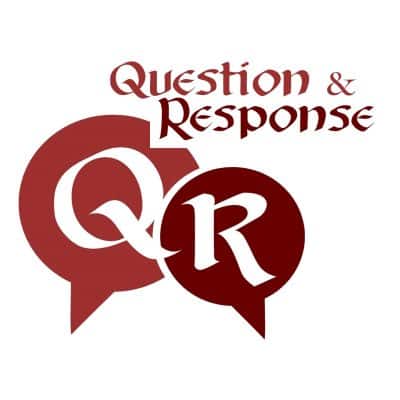Q&R with Brad Jersak – “Do you think the Bible is authoritative? And why?”
Question
Do you think the bible is authoritative? If so, why?
Response
That’s a great question, partly because it’s so tricky. I can’t be sure what our reader means by “authoritative” so I’ll have to supply a definition and work from there. Here’s Merriam-Webster’s definition:

Here we have two different senses. The first would describe how the Bible’s authority is derived from its source. In other words, is it authorized and by whom? The second definition includes a subjective side — is it recognized as having authority and by whom? Let’s take each in turn.
First, is the Bible authoritative according to its source or sources? Do we understand God as the ultimate source? Or was it authored by the people of God? Or some combination of the Holy Spirit and human scribes? And since we know for sure that people wrote it down, to what degree is their limited perspective and worldview in play?
While that is an interesting set of mysteries open to debate, I come at it differently. I start with the authority of Jesus. I recognize his authority as ultimate. Does he authorize the Scriptures, written before him or after him? And to what degree?
Jesus certainly both affirmed the authority Bible by how he used it but also demonstrates limits to that authority relative to himself. For Jesus, both the extent and the limits of biblical authority are defined by what I call the Emmaus Way. That is, the degree to which the whole Bible testifies to Jesus and points to his authority, we read it as authoritative.
When Jesus rebukes the Pharisees in John 5, he makes it clear that you could spend your whole life studying the Scriptures and never once hear the Father’s voice through them IF you don’t understand that they are a testimony of his life, teachings, passion and mission. In fact, the first Christians would not have asked whether the Bible was authoritative. Instead, they would say Jesus was their authority and then they would ask, “Which books testify to this?” And those were chosen for inclusion in their written canon.
Second, is the Bible authoritative according to the recipients? That depends on our orientation to it. Does it operate as an authority in our lives in practice? Does what is says matter to us? Do we read it as skeptics, looking for reasons to dismiss it? Do we read it as fundamentalists, looking to weaponize it? Do we read it as literalists, oblivious to its spiritual meaning? Only you can decide whether you recognize its authority in your life. And if so, how so?
I receive the Bible as authoritative insofar as it testifies to Jesus. I don’t receive it as my authority in history or science or religion. I let the authors say what they say on their own terms and then ask what the message is saying to me about Christ, his gospel and his call for me to grow in love, by grace, toward God and my neighbors.
The technical term for this is the “tropological” sense of Scripture. That’s a fancy word that asks, “When you read the Bible, do you allow its message (Jesus) to transform your will?”
If you do, then you’ll experience its inspiration firsthand. You’ll sense the Spirit breathing life into you and changing your from the inside as you reciprocate in obedience to the voice of Christ.
If we’re not reading it with open hearts willing to be changed, then it seems Scripture actually withholds its meaning from you. Then all we’re doing is playing chess with the Bible in our heads. Practically and subjectively, it has no authority.
My conclusion is that Bible’s authority, both objective and subjective, derives exclusively from Jesus’ authorization of the book and our willingness to live under his Lordship. Apart from reading it for its point, it becomes an impenetrable mystery and probably an offence.











 Plain Truth Ministries | Box 300 | Pasadena, CA 91129-0300
Plain Truth Ministries | Box 300 | Pasadena, CA 91129-0300

